I have some modbus ethernet tcp communications that I'm attempting to do in a DLL. I get numerous TCP Retransmissions from the target device, as seen in WireShark.
(In this image, 192.168.1.5 is the Modbus device. 192.168.1.72 is the computer)
However, when the same code is inserted directly into an application, there are no communication errors.
I'm wondering if DLLs have some sort of lower priority that can cause slower communications, or if anyone may have any insight as to why this code would run without TCP issue in an application, but not in a DLL.
Here is the dll header:
#ifndef __MAIN_H__
#define __MAIN_H__
#include <windows.h>
typedef void *eioTHandle;
#ifdef __cplusplus
extern "C"
{
#endif
__declspec(dllexport) int __stdcall eioConnect( unsigned short ModelId, char *Ip, eioTHandle *Handle );
#ifdef __cplusplus
}
#endif
#endif
And here is the source file:
#include "main.h"
#include <winsock2.h>
#include <ws2tcpip.h>
#include <stdint.h>
#define EIO500_S 0
#define EIO500_MS 1000
#define eioERROR -1
#define eioSUCCESS 0
static uint8_t m_UnitId = 0xff;
static SOCKET m_Sock;
BOOL WINAPI DllMain(HINSTANCE hinstDLL, DWORD fdwReason, LPVOID lpReserved )
{
// Perform actions based on the reason for calling.
switch( fdwReason )
{
case DLL_PROCESS_ATTACH:
// Initialize once for each new process.
// Return FALSE to fail DLL load.
break;
case DLL_THREAD_ATTACH:
// Do thread-specific initialization.
break;
case DLL_THREAD_DETACH:
// Do thread-specific cleanup.
break;
case DLL_PROCESS_DETACH:
// Perform any necessary cleanup.
break;
}
return TRUE; // Successful DLL_PROCESS_ATTACH.
}
int __stdcall eioConnect( unsigned short ModelId, char *Ip, eioTHandle *Handle )
{
WSADATA Wsa;
struct sockaddr_in Server;
int Result;
char Buffer[256];
char InBuffer[256];
// CONNECTION --------------------------------------------------------------
if (WSAStartup(MAKEWORD(2,2), &Wsa) != 0)
{
return eioERROR;
}
m_Sock = socket(AF_INET, SOCK_STREAM, IPPROTO_TCP);
if (m_Sock == INVALID_SOCKET)
{
WSACleanup();
return eioERROR;
}
Server.sin_addr.s_addr = inet_addr(Ip);
Server.sin_family = AF_INET;
Server.sin_port = htons(502);
if (connect(m_Sock, (struct sockaddr *)&Server, sizeof(Server))
== SOCKET_ERROR)
{
closesocket(m_Sock);
m_Sock = INVALID_SOCKET;
WSACleanup();
return eioERROR;
}
// -------------------------------------------------------------------------
for (int Ctr = 0; Ctr < 50000; Ctr++)
{
// SEND COMMAND --------------------------------------------------------
// 5 bytes in a Send Read Multiple Coils command.
int NumBytes = 5;
Buffer[0] = 0;
Buffer[1] = 0;
Buffer[2] = 0;
Buffer[3] = 0;
Buffer[4] = 0;
Buffer[5] = NumBytes + 1; // 1 for unit id.
Buffer[6] = m_UnitId;
// 0 = Function code.
Buffer[7] = 0x01;
// 1+2 = Address.
Buffer[8] = 0;
Buffer[9] = 8;
// 3+4 = Number of bits to read.
Buffer[10] = 0;
Buffer[11] = 8;
if (send(m_Sock, Buffer, NumBytes + 7, 0) == SOCKET_ERROR)
{
continue;
}
// ---------------------------------------------------------------------
// WAIT FOR RECEIVE ----------------------------------------------------
WSAEVENT RecvEvent;
int Ret;
RecvEvent = WSACreateEvent();
WSAEventSelect( m_Sock, RecvEvent, FD_READ );
Ret = WSAWaitForMultipleEvents(1, &RecvEvent, TRUE, 1000, FALSE);
WSAResetEvent(RecvEvent);
if (Ret == WSA_WAIT_TIMEOUT)
continue;
// -------------------------------------------------------------------------
// Check for any reply.
recv(m_Sock, InBuffer, 256, 0);
}
// DISCONNECT --------------------------------------------------------------
Result = shutdown(m_Sock, SD_SEND);
if (Result == SOCKET_ERROR)
{
closesocket(m_Sock);
WSACleanup();
m_Sock = INVALID_SOCKET;
return eioERROR;
}
// Receive until the peer closes the connection.
while (recv(m_Sock, Buffer, 256, 0) > 0);
closesocket(m_Sock);
WSACleanup();
m_Sock = INVALID_SOCKET;
// ------------------------------------------------------------------------
return eioSUCCESS;
}
I've simplified the code as much as possible. The communication is in a loop for testing. The original application would poll this data from the device.
